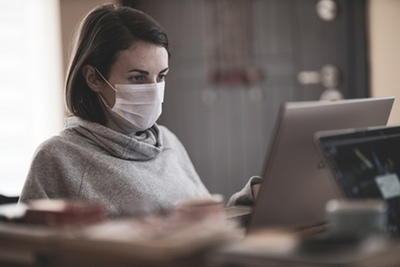In June 2021, a survey reflecting the demands brought on by the pandemic was conducted among our employees. The survey’s objective was to identify any obstacles and suggest activities that could help employees with their working lives.
The survey was carried out anonymously using the Microsoft Forms tool and was available to all employees. Out of the 2,140 employees who were asked to participate, 500 responded by filling in a questionnaire (including those employed under an agreement to complete a job and agreement to perform work). The survey response rate was thus 23.4%.
The questionnaire consisted of 29 questions, six of which served to obtain the respondents’ personal profiles.
 The questionnaire has confirmed that the pandemic negatively affected academic workers and staff members in the age categories of 30–39 and 40–49 most severely, i.e., parents of pre-school- and school-aged children. No significant differences in the perception of the negative impacts of the pandemic were found between the employees of individual constituents. 43% of respondents claimed that the pandemic had made their work more difficult and affected the amount of their work. 40% of respondents had no problems in respect of their work.
The questionnaire has confirmed that the pandemic negatively affected academic workers and staff members in the age categories of 30–39 and 40–49 most severely, i.e., parents of pre-school- and school-aged children. No significant differences in the perception of the negative impacts of the pandemic were found between the employees of individual constituents. 43% of respondents claimed that the pandemic had made their work more difficult and affected the amount of their work. 40% of respondents had no problems in respect of their work.
The majority of respondents expressed interest in having the option to continue working from home.
Respondents who expressed interest in having some help with childcare would most welcome having the option to bring their children to the workplace and have children’s facilities available on site. They would also appreciate it if babysitting services or a creche were provided. However, the majority of respondents who are parents claimed that children returning to school would meet their needs.
We also asked whether there was any interest in the enhancement of medical services. The majority of respondents were not clear on what their employer could offer them. One-tenth of respondents claimed that they would welcome the enhancement of these services, e.g. in the form of premium preventive care and vaccination, and the provision of physiotherapy and massages.
In the area of training, more than one-half of respondents would like to improve their computer skills. The situation was different in the area of consultancy. More than one-half of respondents were not interested in any kind of consultancy, whereas one-third of respondents would welcome professional consultancy.
Almost 90% of respondents were happy with their supervisors. Those who had some reservations stated that it would help them if their supervisors were more interested in them, showed more support and understanding, communicated more and motivated them more. During the pandemic, relationships at the workplace subsided, and one-half of respondents would like to invigorate them with organising informal events. 66% also expressed interest in having more information on the direction the university is taking.
In most cases, they returned to the workplace without any problems. Most stated that in order to make their return to work easier, they adhered to the hygiene measures, underwent testing and received vaccination. Others stressed that they were, for instance, trying to communicate with their co-workers more and meet up with them in informal settings.
We were also interested in what plans for the future at MENDELU the respondents had. Almost 80% of them wanted to continue working in their job position. 12% of respondents were contemplating leaving the university. They felt demotivated mainly due to a low financial reward, their team of people, work duties, the large amount of administrative work and the university diverging from lessons.
 Some of the ideas on how to improve the environment of the university included, for instance, strengthening the sense of togetherness, getting the goals of the university across and holding informal sports and social events on a regular basis. Some suggested that the outdoor and indoor spaces should be made more pleasant. Other respondents would welcome it if the online environment and the option to work from home remained in place, at least partially.
Some of the ideas on how to improve the environment of the university included, for instance, strengthening the sense of togetherness, getting the goals of the university across and holding informal sports and social events on a regular basis. Some suggested that the outdoor and indoor spaces should be made more pleasant. Other respondents would welcome it if the online environment and the option to work from home remained in place, at least partially.
Doctoral students would welcome sharing experience, training in the field of projects, improving services in the cafeteria, establishing a relaxation centre directly in the premises, broadening the range of benefits and holding regular meetings with the management of faculties.
Some of the suggestions of how to improve the atmosphere at the workplace included office and laboratory refurbishment, and creating a kitchenette that would serve as a place for people to meet. Others would like to have a children’s play area on site, and many would welcome improving mutual communication and showing respect towards others.
More detailed results of the survey will be forwarded to the management of the university and its constituents, and will be used as inspiration for further improvement of the working environment at MENDELU.
We would like to thank all those who filled in the questionnaire for their willingness, openness and many interesting ideas.